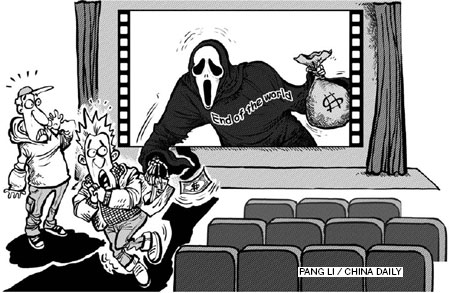The end of the world has been postponed

'Will the world end on the Dec 21?" was the question posted in cyberspace. "No, but rumors about it will," one wag replied. Of course it is foolish to think that the last day on the calendar used by the Mayans centuries ago is really going to be the day our world ends. But it has not stopped commercial interests from playing on people's fears: From the epic box-office movie portraying tidal waves wiping out civilization to the sales of "survival kits".
Scientifically we now know enough geophysics about the Earth to realize we are in no danger of an apocalypse - earthquakes, tsunamis, wild weather and the odd meteor maybe - but that has not stopped doomsayers predicting certain dates and certain rallying points for transponding to some other world. They do not all use the Mayan calendar for the date the world will come to an end - after all they can just dream one up or claim to have had a vision or that they have interpreted some numbers or code from a religious text. A google search lists about 160 "failed predictions" for the end of the world, with many of them making a second attempt. Apart from the mystical fascination with some sort of Armageddon, there are also scripts conceived for a manmade nuclear holocaust.
The possibility of humans self-destructing was grippingly portrayed in the Neville Shute novel, On the Beach, which is set in Melbourne, one of the last cities to be overtaken by the nuclear cloud from an all-out war in the northern hemisphere. Apart from the emotional drama of the main characters facing imminent horrible death, the whole of society is resigned to living only for a few months and people alter their behavior accordingly.
The Terminator movie series based on the premise that a cyberdyne robot came back to the present from a future that had experienced a widespread nuclear war, the heroine was told that the war had occurred on Aug 29, 1997, and later in the series that "J-Day" (Judgment Day) was moved to July 25, 2004. In the movie the heroine "foresees" the onrushing nuclear blast overwhelming a playground of happy children and sees them incinerated to skeletons till she jolts back to reality.
But the Mayans meant no harm when they simply gave up on a calendar too far in the future for them. Although no doubt the media will play it up a bit, before and after. In reality, Dec 21, a Friday, will come and go, like any other day.
However, talk of the end of the world ending should give cause for reflection.
A writer is out strolling in rural England one day and comes to the home of a renowned philosopher, who is tending his garden. The writer pauses, ponders the scene and then asks: "What would you do today if it was the end of the world?"
"I would finish tending my garden," is the reply.
Or on an earthier twist: Two old hobos are sitting on a park bench idly watching the world go by. "What would you do if it was announced that an asteroid was going to destroy the Earth in seven minutes?" one of them asked the other.
His companion thinks and thinks and then finally replies: "I would make love to the nearest thing that moved. What would you do?"
"Not move."
If there were really only a few days to live, what would you want to do? Would you still want to make money, have power? Most people would probably want to spend the time with their family and say goodbye to their friends. In this respect, the Mayan prophesy of Doomsday should be a wake-up call, because the end will come for all of us one day.
For most of us, it will probably have nothing to do with a specific natural disaster. But all of our timelines are running down and could be truncated at any time. The world's natural death rate is estimated at about 150,000 a day, so around that figure is the number of people who will die on Dec 21, 2012, and not by asteroid or World War III.
For the rest of us, let's savor the gift of life.
The author is an Australian researcher collaborating with Chinese academic and commercial institutions.
























